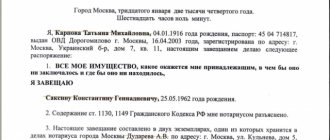Discharge of a disabled person from an apartment with his consent
If the disabled citizen himself does not object to deregistration, the deregistration procedure proceeds without difficulty. State bodies will be able to begin consideration after the citizen (or his official guardian) submits a corresponding application. There may be several nuances in this issue, depending on a number of circumstances:
If a disabled person is able to move independently
In this case, he needs to personally contact the Federal Migration Service of Russia and go through the discharge procedure. To do this, you will need to provide a minimum set of documents:
- Passport of a citizen of the Russian Federation;
- Identification code;
- Certificate of disability;
- Certificate of family composition;
- Document confirming ownership (if any). This may be a purchase and sale agreement, an agreement and exchange, or a deed of gift.
If a disabled person is under guardianship
Having a notarized document on guardianship of a disabled person, the legal representative of a person with a disability can apply to the Federal Migration Service. To do this, you will need to have an application signed by the citizen being deregistered, a passport of a disabled person, a passport of a guardian of a legal representative, an identification code, a certificate of family composition, a document confirming ownership (if any) and a certificate confirming guardianship.
If a disabled person is unable to move independently
The discharge procedure in this case largely coincides with the process of deregistration of a disabled person under guardianship. The legal representative of a citizen deregistering or his guardian can contact the Federal Migration Service. The package of documents includes:
- Certificate of legal representative or guardian;
- Certificate of disability;
- Passport of the legal representative or guardian;
- Identification code;
- Title document for housing (if available).
In addition, if there is a notarized power of attorney issued by a citizen with a disability, any person can apply to the Federal Migration Service. According to the law of the Russian Federation “Rights of citizens to free movement and choice of place of residence within the Russian Federation” dated June 25, 1993 (No. 5242-1), in the absence of factors preventing the deregistration of a citizen with a disability, deregistration is carried out within 3- x working days .
They do not register a disabled person
a document that is the basis for a citizen to move into residential premises (order, agreement, statement of the person who provided the citizen with residential premises, or other document), or its duly certified copy. A citizen of the Russian Federation has the right not to present a document that is the basis for the citizen to move into a residential premises (social tenancy agreement, rental agreement for residential premises of a state or municipal housing stock, a state-registered agreement or other document expressing the content of a real estate transaction, a certificate of state registration rights or other document), if the information contained in the relevant document is at the disposal of state bodies or local governments. In this case, the registration authority independently requests the relevant document (information contained in it), an extract from the relevant register, other information in accordance with the legislation of the Russian Federation from state bodies, local governments and registers the citizen at the place of residence no later than eight working days from the date of submission of an application for registration at the place of residence and an identification document in accordance with the legislation of the Russian Federation.
A citizen of the Russian Federation (except for the case provided for in Article 6.1 of this Law) who has changed his place of residence must, no later than seven days from the date of arrival at his new place of residence, contact the official responsible for registration with an application in the prescribed form. In this case, a passport or other document replacing it is presented that identifies the citizen;
We recommend reading: What is an agreement for the assignment of the right to claim an apartment in a new building
If you need to evict a disabled person without consent
If there is a need to evict, but without consent, you must adhere to certain rules. If he is not the owner, then you can vacate the premises when:
- Premises intended only for residential purposes are not used for their intended purpose (trade, office, warehouse).
- A disabled citizen has not lived in an apartment for more than a year.
- Failure to pay utility bills.
- Damages the premises, creating a danger to the health of other residents or the entire house as a whole.
All of the above points can contribute to eviction even when a disabled person is the owner.
If you need to write out without reasons and evidence of violations, then the idea will not end successfully. Evictions can only be made when some offense has been involved.
Discharge a disabled person of group 1 from the apartment
2.2. You need to go to court with a claim for occupancy - non-obstruction of use. Alimony has nothing to do with the issue. It would be necessary to pay for housing and communal services; it is not clear from the question whether you pay or not. It is also possible to make a demand for the division of bills for housing and communal services. If you do nothing, they may write you off.
1. A social rental agreement for residential premises may be terminated at any time by agreement of the parties. 2. The tenant of a residential premises under a social tenancy agreement, with the written consent of his family members living with him, has the right to terminate the social tenancy agreement at any time. 3. If the tenant and his family members leave for another place of residence, the social rental agreement for residential premises is considered terminated from the date of departure. 4. Termination of a social rental agreement for residential premises at the request of the landlord is permitted in court in the event of: 1) failure by the tenant to pay for residential premises and (or) utilities for more than six months; 2) destruction or damage to residential premises by the tenant or other citizens for whose actions he is responsible; 3) systematic violation of the rights and legitimate interests of neighbors, which makes it impossible to live together in the same residential premises; 4) use of residential premises for other purposes. 5. The social tenancy agreement for residential premises is terminated due to the loss (destruction) of the residential premises or the death of the tenant who lived alone.
This is interesting: How can you use Regional Maternity Capital in 2021
Who has the right to live in the apartment
One of the negative aspects of shared ownership is the possibility of selling the share to third parties. Thus, strangers may one day move into the living space. Therefore, it is important to decide who can live in the residential premises.
The following persons have the right to reside in a privatized apartment:
- share owners;
- citizens with permanent registration;
- persons with temporary registration;
- minor children of citizens of all the above categories.
In essence, registration gives the right to move into a residential premises. The exception is for owners. They can move in without registration. However, many situations must be considered individually.
Is it possible to discharge a disabled person from an apartment to nowhere if he is not the owner?
Well, since he lives in someone else’s apartment, and the heirs are not ready to live with a stranger, then they generally have the right to dispose of the apartment as they want - to sell it, for example. To do this, they need to discharge everyone registered from the apartment. in principle, if a pensioner does not have any rights to the ownership of this apartment, then the heirs can write him out and kick him out. This is their property and it is unlikely that their court or other body will oblige them to somehow help this pensioner, who is a stranger to them.
The law provides for two procedures for deregistration - voluntary and forced. With the consent of the citizen, every passport officer is obliged to issue an adult applicant who is legally capable and without any restrictions. To do this, the applicant will need:
The procedure for discharging a person from an apartment “to nowhere” if he is not the owner
A long period of time spent without registration will be considered to be a stay without registration for 90 days after being discharged from the apartment at the previous address. The fine will range from 1,500 to 2,500 rubles. A long absence of registration will be noticed when contacting the registration authorities to obtain registration for an apartment.
It will take employees about three days to remove a tenant from the apartment. Next, the already discharged citizen takes the departure slip issued to him, which is valid for a month. It is with its help that he will be able to re-register later, so it must be saved.
How to Evict a Group 3 Disabled Person from a Private House
- I am disabled and I am being evicted from my apartment.
- Can a group 2 disabled person be evicted from a privatized apartment?
- Can the owner evict a disabled person from the apartment 2 gr. , soaked in it.
- Can a disabled person living in it be evicted from an apartment based on a complaint?
- Is it possible to evict a disabled person of group 2 from an apartment into a room when exchanging an apartment?
- Can a disabled person of the first group be evicted from an apartment for non-payment?
- Is it possible to evict a disabled person with cerebral palsy and young children from a mortgaged apartment for non-payment?
How can temporary registration be dangerous for the owner of a residential premises?
If you find it difficult to formulate a question, call, a lawyer will help you: Free from mobile and landline Free multi-channel telephone If you find it difficult to formulate a question, call a free multi-channel telephone, a lawyer will help you 1.
- For non-owners, the extract is carried out according to the generally accepted procedure with consent.
- In the absence of consent, deregistration is accompanied by a number of difficulties. The article of the Housing Code of the Russian Federation states that in order to resolve such situations it is necessary to go to court. The court's decision will depend on whether the disabled person is the owner, whether he lives in the apartment, or whether he is declared missing.
Other cases
There are other categories of persons whom no one has the right to evict. Among them:
- mistakenly recognized as missing - if the missing person shows up and declares his claims to the apartment, the court may rule on preserving his right to live indefinitely or use the premises for a certain period;
- dependents or other persons who are supported by the owner and live together with him;
- persons in whose favor a testamentary refusal is executed - if a living space under a will is transferred into the ownership of one person while retaining the right of use by another person, then the latter cannot be evicted (for example, when transferring property to children, but retaining the right of residence for the spouse).
The rights to use the premises by the listed persons can be challenged in court, provided that they are the owners of another property or have the right to reside in it.
Eviction from an apartment of a registered person who is not the owner in 2020; claim, disabled person, by court decision
But that’s not all - the defendant is given a month to appeal the judge’s decision. If there are no objections, the secretary prepares to publish the resolution - this takes about 10 days. But in practice, issuing a writ of execution can take 2-3 weeks. Direct check-out – 3 days + 7 days to vacate the premises.
- If there is a violation of the rights of other residents, it is necessary to call representatives of law enforcement agencies several times to draw up a report about non-compliance with public order.
- Further, it is required, regardless of the basis for eviction, to inform, preferably in the form of a written notice with delivery by signature or registered mail, of the need to leave the premises for certain reasons.
- If the requirements specified in the letter are once again ignored, you can file a claim in court.
- When a positive decision on eviction comes into force, you must obtain a writ of execution from the secretariat. It must be taken to the Bailiff Service at the location of the property in the region. Law enforcement officers will take coercive measures to organize the eviction of citizens who ignore the requirements of the law.
You may be interested in:: How to Call a Technician from BTI to Make Changes to the Registration Certificate of a Residential Building
Deregistration of incapacitated citizens with a degree of disability
As a rule, this procedure is carried out when changing place of residence. An incapacitated disabled person can be deregistered only with the permission of the court. To do this, the following conditions must be met:
- The disabled person moves with a guardian;
- The disabled person is provided with new housing with an appropriate area;
- Living conditions at the new place of registration are no worse than at the previous one;
- The disabled person gives his consent to change the place of registration.
The progress of the trial is monitored by representatives of the guardianship and trusteeship authorities, who monitor the observance of the rights of the disabled person.
What to do if a person is a pensioner
By virtue of Part 2 of Article 31 of the Housing Code of the Russian Federation, if a pensioner is a close member of your family, and you are the owner, then you are obligated to give him exactly the same rights as other family members.
It will be very difficult to evict such a pensioner and only if you prove that he has a different place of registration or is no longer your relative for any reason.
If you need to deregister a person who is not your relative, and you are simply renting out an apartment to him, or he lives there without any rights to it, then the only way, of course, is to go to court.
And it’s better not to start without lawyers, because the courts mostly side with single pensioners, even if they are wrong in your general issue.
In this case, the grounds for filing a lawsuit may be:
- delay in payment for accommodation, utilities;
- destruction of property or damage to housing and much more.
In each case, the package of documents will be different; the only thing that will always need to be submitted is a document that confirms your ownership.
Do not be afraid to defend your rights at the legislative level, seek the help of lawyers and specialists in other fields to resolve your housing issue. The Housing Code of the Russian Federation does not cover all possible aspects of life, and different circumstances influence the outcome of the case in their own way. Be prepared for anything and rely on the laws, because they protect your rights.
Register a disabled person
1. Can the guardianship authorities (which ones?? social security? hospital?) perceive an infringement of any of the brother’s rights? 2. Can there be problems when registering a disabled person in a privatized room? Those. Do you need the consent of the other people living in the apartment, the owners or the hired ones? And if so, which type of neighbors is preferable—owners or social renters? 3. Could problems arise during privatization due to the fact that a disabled person has been evicted from the apartment? I did not use the right to privatization; if necessary, relatives will sign waivers, etc.
The brother is a disabled person of the 2nd group, has schizophrenia, is not deprived of legal capacity and does not require constant “supervision and care” according to the statement of the attending physician. There is no reason to place him in a boarding school. Not violent, but with “oddities”, i.e. with little communication it is clear that the person is sick.
12 Jun 2021 uristlaw 335
Share this post
- Related Posts
- If they don't give you a plot for 3 children
- Federal Pensions What is it?
- What payments are due to a veteran of military service in the Rostov region?
- What to do to avoid having your car taken away for debts







